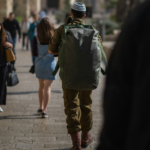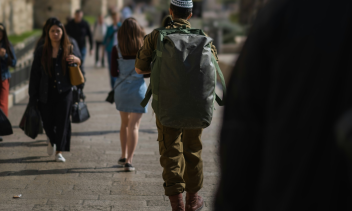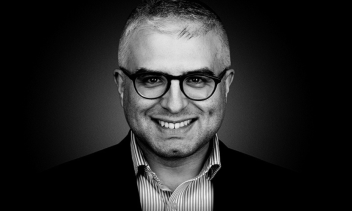Expectant olim are asked to write an “aliyah essay” when completing their immigration forms. Rabbi Yehoshua Fass, co-founder of Nefesh B’Nefesh, holds tens of thousands of such essays, as he off-handedly remarked in our conversation this week. Now, we want to share them with you.
Here are seven personal accounts of aliyah, about the pilgrimage from “Outside the Land” to “The Land.” Their Zionist fervor runs deep, and it peeks through their raw words. See for yourself.
‘Don’t Wait as Long as I Did’: A 94-Year-Old Holocaust Survivor Joining Her Family in Israel
I was born in Berlin in 1927 and fled to Belgium with my family to escape the Nazis.
Unfortunately, we had to flee again when the Nazis invaded Belgium, and I was caught on a train with my father while trying to get to the Swiss border. By some miracle, my mother went unnoticed and made it to France. It was on that train that I was separated from my parents at the age of 13—watching as my father was torn away, never to be seen again. His last words were, “Take care of your mother.” And I did.
Today, I am living in Israel, surrounded by my family. One of the main reasons why I made Aliyah was to be closer to my two daughters, seven grandchildren, and nine great-grandchildren, though living in Israel has its challenges, such as difficulties for non-fluent Hebrew speakers.
While I am a very independent person, I feel handicapped at times because I must rely on my daughters for their help. Thankfully, I have still adjusted well.
I can’t attend a regular Ulpan, so I asked Nefesh B’Nefesh if they could recommend a Hebrew tutor. They answered immediately and paired me with Sarah, a volunteer Hebrew tutor. Together, we learn basic vocabulary and work on conversational skills.
Adjusting to life in Israel was not easy, but I have found a community of English speakers in my assisted-living complex who have welcomed me with open arms. Most importantly, I am no longer oceans apart from my family.
If I were to give advice to future Olim who are in a situation like mine: Don’t wait as long as I did. Come when you can. Also, I encourage future or new Olim to reach out and ask for help. Nefesh B’Nefesh has been there for us even after we made aliyah, which is a resource I am grateful for.
‘Don’t Stop Dreaming’: An 18-Year-Old Lone Soldier Fulfilling His Zionist Dream in the IDF
I was born in Johannesburg, South Africa, and at the age of three, I moved with my family to Chicago to a community with people who value Judaism and the Land of Israel. It was no surprise I ended up making aliyah.
My first trip to Israel was when I took a year to learn at Yeshivat Hakotel at age 17. Yeshivat Hakotel puts so much emphasis on Torah, the Jewish People, and the Jewish homeland that it was no surprise that I quickly fell in love with Israel.
I learned in Yeshivat Hakotel for 1.5 years and was then drafted into the IDF to Combat Engineering 603 with nine of my good friends and a bunch of Israelis from my yeshiva.
In the army, I wrote a journal entry almost every day, which I sent to friends and family. I am currently putting these journals into a book in order to motivate and inspire others.
While in the army, I made aliyah, and since then, I’ve been in yeshiva—learning, helping around, teaching, giving back to those like me, and helping them in their next steps to live a more meaningful life.
I’m also learning for semikha at World Mizrachi and during the day I work at Aish, helping out in the development department. There have been many challenges, but understanding the greater picture—and knowing there is always Someone there to turn to—helps.
Being in Israel has helped me grow in ways I’ve never thought was possible. Israel is the biggest miracle, and I get to experience it! My most inspiring story so far though is the day my younger sister told me she was making aliyah. The amount of joy and inspiration I got that day, will last me a lifetime.
Don’t stop dreaming. Remember that first day of what you were feeling. Whether that be learning in yeshiva, going to the army, making aliyah, etc. Never forget that amazing feeling and excitement you had for what the future holds.
Forgoing a Higher U.S. Salary, a Nurse Aims to Help Israel’s ‘Doctor Crisis’
Since I made aliyah, I completed an Ulpan program, worked in Terem for two years, got married, then worked in Hadassah Hospital’s pediatric and postpartum units, and meanwhile had two children, baruch Hashem. It’s been a busy but great six years
As a Jew, I am deeply connected to the State of Israel. I feel it is the Jewish homeland, and I feel an incredible desire to live in and contribute to the country. After nearly 2,000 years of exile, it amazes me that we have a Jewish state and a Jewish army, and I can’t imagine living anywhere else.
This olah graduated nursing school in 2015 and thought she’d work for a couple of years before she and her husband fulfilled their dream of making Aliyah. But just a few months after she learned of the brutal murder of mother-of-six and nurse Dafna Meir in her village of Otniel, she decided she could no longer put off making Israel her home. She felt a strong connection to Dafna, who was also a nurse, and decided to dedicate her Aliyah to her.
I connected with her so fully, both of us being nurses, that I really needed to be in Israel sooner than later. I kept thinking if I can continue her legacy and contribute to Israel as best I can, that’s what I want to do.
She met with Dafna’s widower, Natan Meir, just five days after becoming an Israeli citizen in 2016, and it was the most special day of her life. Natan says that her dedication to Dafna’s memory has brought light into his family’s darkness.
‘Take the Leap’: Moving to Tel Aviv in His Early 20s for High-Tech
Making Aliyah was a decision I had been considering for a long time. Growing up with a strong connection to the country, I knew that if I didn’t take the leap now, I might never have the chance. After making the decision, I faced a number of bureaucratic challenges, such as setting up Sal Klita payments, as well as finding a job that aligned with my career aspirations.
However, despite these challenges, I have found that my life has been greatly enhanced by living in Israel, particularly in the bustling city of Tel Aviv. I am lucky to be living with one of my best friends since grade two. Is there anything better than that?
I was also able to find my current job through the SalesClass program via Nefesh B’Nefesh Upgrade. Despite my lack of experience in the tech field, the course leaders provided me with unmatched guidance and support that helped me showcase my strengths during interviews. The experience was truly life-changing, and I couldn’t be happier with where I am today—working in the intersection of tech and hospitality at Easyway.
One of my favorite “only in Israel” moments was when I was walking along the beach in the morning, and this truck driver had pulled over on one of the lanes on the side of the road to pray. Just seeing someone in a tallit and tefillin standing there in the middle of the street in morning rush-hour traffic was special.
For anyone considering making aliyah, my advice would be to take the leap. Don’t just move here; once you arrive, be bold and do things you wouldn’t normally do. If you’re scared or unsure, do it anyway. It’s always better to regret doing something than to regret not doing it at all. And of course, make the most of your time here by exploring the country and its people. Israel is an amazing place, full of history, culture, and opportunities. I am so grateful for the chance to call it my home.
‘We Feel Light, We Feel Happy’: A Young, Religious Family Joins Ra’anana
Nothing was missing. We loved New Milford, NJ. We had our forever home, family, friends, and amazing schools. We were happy. Very happy. Our life was mapped out, our future planned. Then, our children started coming home from school, forming a different picture of the life that they had envisioned for themselves. They dreamed of moving to Israel. At the same time, there was a big rise in antisemitism and we felt as if the world was alluding to us that our children’s future was no longer in America.
We were those people who were never moving to Israel. We shocked and surprised everyone with the decision of aliyah.
“We’ll believe it when we see it” is what all our friends said to us.
We had no expectations. We assumed it would be an extremely difficult transition for our kids and especially for us. We decided to come to Ra’anana because we have family here and knew that would ease the transition. Everything about this move was a leap of faith—a jump we were willing to take for our children. They will forever be our why.
The beginning was bumpy. We arrived here and everything that we had thought was perfectly planned, fell through. The Ganim were a mess, our home which we thought we were moving into, was no longer. I was eight months pregnant. But those were just road bumps. The path was still clear. We were together on this adventure as a family and we chose to make it work, because it had to work. We had a precious sabra baby.
We’ve since made a beautiful home for ourselves. Our kids have adjusted beyond our wildest dreams. Some fluent in Hebrew, others less so, but extremely happy nonetheless. We’ve made so many wonderful friends and it feels like home. We feel light, we feel happy, and we’ve found our new forever homeland.
‘It’s Our Home’: Making Aliyah at 18 and Working at an Israeli Non-Profit for National Service
I made aliyah because I cannot picture my future in any other place. I want to build my family and life here. It’s a bonus to hear the reactions of people when they hear you’re a Lone Bat Sherut and you live alone in this country. It really never gets old, and it’s worth it to move here just for the praise and ego boost!
I decided to serve in Sherut Leumi because I really wanted to immerse myself in Israeli society and learn more about the culture, all while meaningfully contributing to our country because it’s our home.
Keren Or is a Gan and school for kids with special needs and visual impairments. I work in one of the Ganim with kids ages 4-7 who are lower functioning and have CVI (cerebral/cortical visual impairment). I do everything that needs to be done with them—I participate in their therapies, set up their wheelchairs, walkers, standers, and assistive gaze technology, prepare food and feed them, play with them, and so much more!
I absolutely love working here and I highly recommend it to anyone who is interested in doing Sherut!
For a Quieter Life, a Young Couple Moves to the Negev with Two Children
We have been wanting to make Aliyah for several years now. The main reason we made aliyah was because of Zionism. My husband is Israeli, and we wanted to return not just to his home but to our ancestral home. We wanted our kids to experience childhood as Israelis. Our aliyah was delayed for a variety of reasons, but we finally decided it was now or never. Our older son is 12-years-old and it will be harder to adjust if we delay. Also, with antisemitism rising from every direction, I know we made the right choice.
We moved to the south of Israel because my husband’s parents and most of his family live in Be’er Sheva, so we wanted to be close to the family. There are fewer English speakers here, but we also felt we will acclimate faster that way. We live in Lehavim which is a small and very warm, welcoming community. All our neighbors made us baked goods when we moved in. It was quite shocking in a very good way.
Some challenges include getting all your documents in order when you first arrive. Also, I am lucky because my husband is Israeli and can read and write in Hebrew. I use Google Translate and often respond in English. I will have to do Ulpan soon so I can get fully immersed into society.
Something I really liked was when I called the new kibbutz that had an event for children to come and garden and do a variety of activities. I asked him “How long is the gardening?” His answer was, “As long as your soul requires.”
Everything here in Israel has a deeper purpose and to witness such a small population make such an amazing country in a short period of time is magical. It is inspiring to be here. My kids are in tzofim (scouts) and there have been some challenges with the language, but the young teenage leaders go out of their way to help my kids feel welcome. Being here during the holidays and Simchat Torah with the music and celebration in the streets is very exciting. Israelis travel a lot throughout the country and abroad. Hopefully we can do that soon as well.
I think if you are planning to come and are serious about it, start the process as soon as possible.








